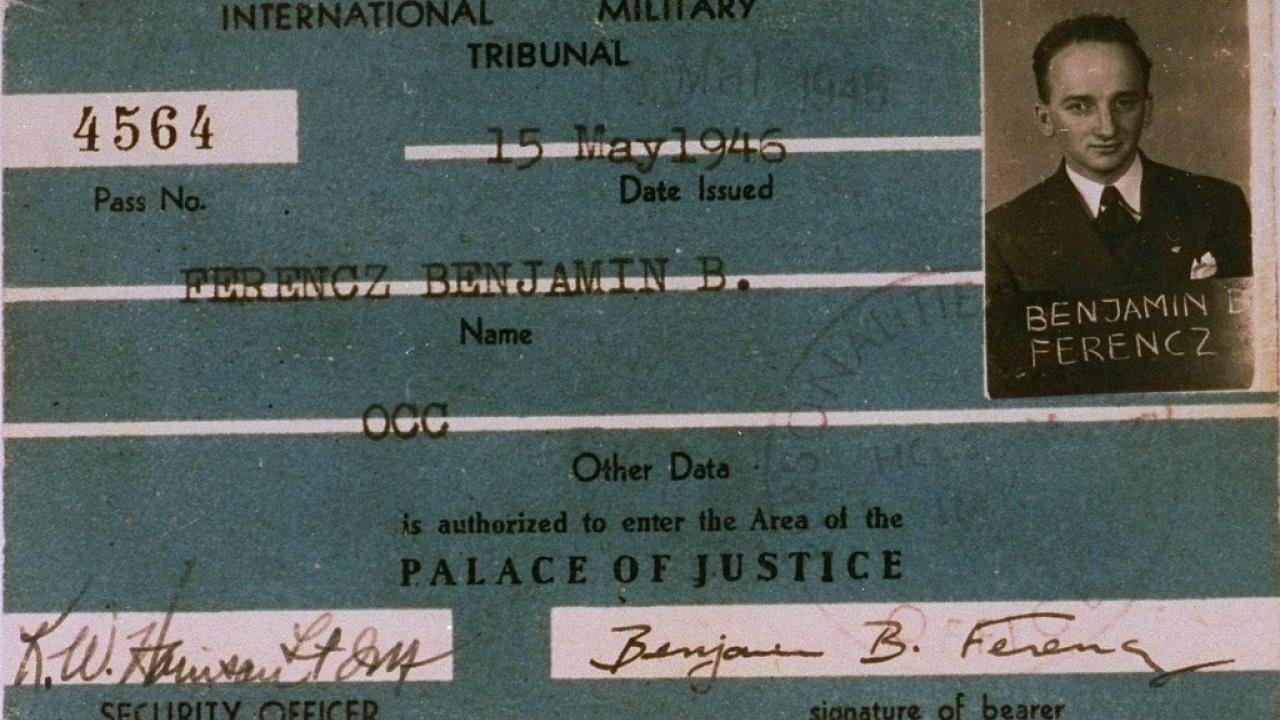
"It can be done and we should never be defeatists:" Celebrating the Life of Benjamin Ferencz
Ferencz, the last living Nuremburg war-crimes prosecutor has died at 103
Quick Summary
- Benjamin Ferencz, the last Nuremburg war-crime prosecutor has died at 103. He’s always had a special place in the Human Rights Studies courses I teach, especially HMR 131 Genocide.
I knew someday I would need to write this. Benjamin Ferencz, the last living Nuremburg war-crimes prosecutor has died at 103. He was one of the first Americans to conceptualize the Holocaust as a coherent and pre-meditated crime and was an unfailing advocate for the International Criminal Court. He was a man for whom peace and justice were intertwined and obviously so.
He’s always had a special place in the Human Rights Studies courses I teach, especially HMR 131 Genocide. In the last days of the each quarter I teach, I’ve shared an interview he did with POV in the early 2000s about efforts to create the International Criminal Court and the US reluctance to join. At least 2000 of students have watched it.
In the practice of Human Rights Studies, we celebrate human rights achievements and those whose work and lives are dedicated the achievement of human rights for all. Ferencz has always been with us in that work and knowing he was still alive and speaking up for his ideas was a welcomed note of joy at the end of an academic quarter during which the stories of oppression and failure were so unrelenting.
Ferencz wasn’t much older than my students are when he went to war after having worked his way through Harvard Law. He recalled liberating camps and gathering evidence of atrocity. His message of courage and his conclusion that though hard, human rights change is achievable is my valedictory message. It can be done he assures us in the interview:
Young people are dying in wars around the world because we have failed them, failed to build the institutions that we need in order to create a peaceful world, and it can be done, it can be done. Don't tell me that we don’t have the intelligence to organize this planet in such as way that its resources can be shared equitably to eliminate the causes of discontent and drive people to kill…How do you avoid war? No one’s ever avoided war before. Well…we never landed on the Moon before…we never had the internet before, we have all these things, miraculous! People are entitled to their religions and their opinions, but they are not entitled to go out and kill their neighbors because they are different and they should know that those who preach those policies will be brought to the rule of law, there’s nothing difficult about that…it’s just common sense. So, use your common sense and be courageous. Ask yourself is there a better a way.
When I went to school there was no such thing as Human Rights Law, no such thing as International Humanitarian Law. I knew the man who invented it, René Cassin. He won a Nobel Prize for that. There was no such thing as Genocide. I knew Raphael Lemkin, the man who invented that. So, I have seen these changes coming in our lifetime. So, it can be done and we should never be defeatists. And don’t tell me me it can’t be done. It’s so obviously correct that law is better than war and that it’s better to live in peace with human rights than living in war and killing people whom you don’t even know.
One exchange in that interview brings a collective tear:
Because as a liberator of many concentration camps beginning with Buchenwald and going through to Mauthausen at the end of the war, it was my job to get into the camps and collect evidence for military commission trials which had in mind at the time I saw the crematoria going, I saw the dead bodies all over the place, I experienced the horrors of war itself. And I’ve come to the conclusion that there’s only one answer to this: we must stop war making.
Interviewer: You have such a great sense of humor. How to you approach such serious subjects?
It’s very simple. If you are crying on the inside, you better be laughing on the outside or you will drown in tears…that’s it.
